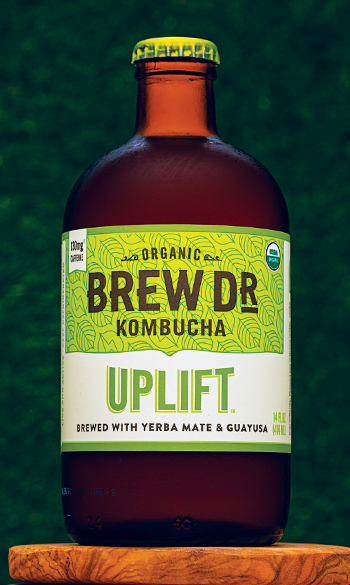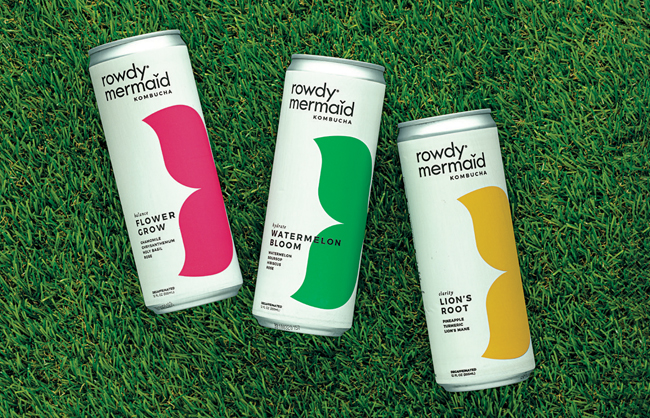Our Drink Is Health: Kombucha Makers Go Platform To Spur Growth
Just a few years ago, kombucha had broken out into the mainstream as one of the top categories in the emerging better-for-you beverage trend. But recent years have seen its growth slow, even as consumers during the pandemic raced to buy healthy food and beverage products en masse.
Matthew Barry, senior consultant for beverages at Euromonitor International, told BevNET that although other functional beverage categories saw extensive growth in 2020, when pandemic-panicked consumers sought out drinks with immunity-boosting or relaxation-based benefits, kombucha only saw mild, stable growth.
But the slowdown in the category predates the pandemic, with the market assimilating an influx of new functional beverages that seem to take aim at the characteristics kombucha embodies: gut health-friendly “pops” providing an alternative better-for-you soft drink, yerba mate drinks fueling the expansion of plant-based energy, and probiotic and juice shots meeting the need for immunity and wellness.
While many kombucha brands attempted last year to underline the connection between gut health and overall health that helped generate increased sales for innumerable functional brands, Barry said that consumers still aren’t making the connection between balanced digestion and immunity that brands want them to see.
“That’s been one of the key problems, it just hasn’t really resonated with consumers’ functional demands the way that I think it would have needed to,” Barry said. “I think the challenge is just that there’s a lot of other functional stuff on the market these days. Kombucha once had a particular place as being the healthiest soft drink on the market, and it did have the potential to be sort of the gold standard for functional, healthy beverage. But now there’s just so much out there, it’s hard to seem new and exciting.”
Recognizing the increased competition on shelf, some kombucha leaders have even begun looking at the category from a broader perspective. Health-Ade co-founder Daina Trout told BevNET in August that she believed seeing kombucha as its own category could be a mistake, suggesting that it belongs to a much more expansive functional health and wellness food and beverage space.
However, GT’s Living Foods founder and CEO GT Dave told BevNET via email that as retailers rework the shelf set amid increased competition, he believes that better differentiating kombucha from outside products will help decrease confusion and that “the key for category stability and long-term growth is the delineation of raw kombucha from heat treated, or pasteurized offerings and other shelf stable ‘function beverages.’”
Barry compared the plateau to the trajectory of coconut water, which saw huge expansion in its early days as a new healthy beverage option, but has since levelled out. However, like coconut water, kombucha could drive growth in a similar way: by emphasizing its use as a base ingredient for differentiated products, much like how coconut water has been used as the base for sports and hydration products. Among top brands that already appears to be happening: this year saw the debut of energy drinks from Humm and Brew Dr. while Health-Ade tacked on kombucha-based mixers.
However, Barry suggested there may be an identity crisis occurring for the core of the category, as brands send mixed messages around the key question of ‘What is Kombucha?’ Is it a gut health product? An immunity product? Or is it the overall best healthy drink you can have?
“I think it’s trying to do the third one a lot,” he said. “And that’s the challenge, because there’s so much new stuff out there making similar claims. I think they’re just struggling with that a little bit.”
New Frontiers in Convenience and Club
Even as the category stalls, many of the leading brands in the space have continued to see sales rise. That’s in part the result of innovation and brand growth into previously untapped channels. Newly installed Brew Dr. CEO Dan Stangler, remains optimistic about the future of the category, especially as retail spaces like convenience and club come online. The hope is to move past the category’s low household penetration of about 16%.
Stangler, who assumed the CEO role in July, said Brew Dr. is currently working to expand its presence in the convenience, club and ecommerce channels, with an emphasis on new innovations in both product and packaging formats to meet the specific needs of consumers in those spaces.
Earlier this year, the Oregon-based company relaunched its yerba mate energy line, Uplift, in cans, adding flavors in the hopes of opening up c-store accounts and appealing to grab-and-go consumers. Stangler noted that so far that strategy is working, but the product is also performing well in conventional grocery, citing strong sales in stores like West Coast chain WinCo. Beyond energy, the brand has also emphasized seasonal flavor launches for its core kombucha line in grocery and natural, embracing multipacks for Costco stores as well.
Going forward, Stangler pointed to evolving use occasions for kombucha helping drive unique channel sales, and suggested it’s up to brands to tailor their innovations wisely. Over the past several years, he noted that shoppers have adopted kombucha for a range of dayparts, including the classic better-for-you soda alternative (as the category has so frequently been positioned), non-alcoholic indulgence, social tonic, “a fancy coffee” and functional gut health drink.
“All of this is really starting to make its way into the mainstream and that’s what’s creating the opportunity in c-store, where it’s more on-the-go and impulsive,” Stangler said. “And then in club, where there’s going to be a bigger pack size and a little bit bigger commitment [from the consumer], we have found that variety is really important.”
Broadening brand platforms through new innovations also goes well beyond Brew Dr. Since last year Health-Ade not only rebranded its core line with more mainstream friendly packaging, but also debuted its kombucha-based cocktail mixers, a functional Health-Ade Plus line and its healthy anytime Pop line. Humm Kombucha has emphasized shelf-stable expansions to increase placements in store and has debuted zero sugar options, a Whole30 Approved line, and most recently introduced an energy drink. Smaller brands have also expanded their portfolios beyond kombucha to fuel growth; Rowdy Mermaid is appealing towards wellness-minded consumers with its Adaptonic line, Tribucha has also entered the functional “pop” set, and recently-acquired Big Easy Bucha has moved into juice shots and tepache.
“I think the benefits of things like low- or no-sugar, the packaging formats with an increase in multipack offerings — that’s all been a really high growth business for us,” Stangler said. “Even being thoughtful about the occasions and how we’re showing up in different channels to tell that story, it’s part of the reason we’re starting to connect with new consumers again.”
GT Dave agreed that channel expansion is significant to kombucha’s ability to move ahead, but noted that despite some overall slowdown in the category it is still growing at a 19.5% compound annual growth rate, and is projected to reach $7 billion by 2027.
“As the retail landscape continues to evolve in a post-pandemic world, consumer behavior and shopping habits will dictate the path forward,” Dave said. “We’re taking an Omnichannel approach focused on providing a seamless consumer experience regardless of where the customers choose to shop. Whether one shops online from a mobile device, laptop or in a brick-and-mortar store, we want our brand and the kombucha category at the forefront of the consumer experience with strong distribution and availability.”
There is also another channel where kombucha is making an impact: liquor. Barry noted the rise of hard kombucha has come as alcohol consumers are branching out beyond hard seltzer and seeking more better-for-you options. The growth of that segment has also driven investor interest; in November, JuneShine closed a $24 million Series B funding round with nationwide expansion as a key goal for the brand. However, like non-alcoholic kombucha companies, JuneShine said it is looking towards other categories as a means of expanding its platform and aims to focus on being an overall “better-for-you alcohol brand, not product” with plans to launch non-kombucha lines in the near future.
Emerging in the Changing Set
So with growth on some fronts, is the kombucha boom really getting quieter?
“I would say that this is not so much shrinking as much as it is a massive refocusing,” said Jamba Dunn, CEO of Colorado-based kombucha brand Rowdy Mermaid.
Founded in 2012, Rowdy Mermaid is an emerging national player in the kombucha set, with sales up double digits year-over-year as of October, according to IRI. The brand in large part has grown by setting itself apart from category leaders through a focus on expanded functionality and sustainability (its drinks are packaged in cans and each flavor contains a variety of ingredients, including antioxidants and adaptogens, to boost overall health).
With many top brands still growing, Dunn said he believes the category slowdown today isn’t a complete stall, rather it’s indicative of a shakeout among smaller companies and a shift away from artisanal and local products. He noted that there’s been a reduction in the number of small kombucha brands reporting data to SPINS and suggested regional brands appear to be “falling off.”
“That seems to say to me that this [idea that] local is synonymous with helpfulness and environmentalism and all of those concerns, that doesn’t have as much currency anymore as it’s the larger companies who are actually in the mix with the supply chain and making big decisions to try to clean up supply chains,” Dunn said. “I’m seeing the currency of ‘local’ sort of falling away for the kombucha category.”
Even with national aspirations, Dunn said, the company isn’t ready to jump outside of its comfort zone in the natural, specialty and grocery channels. Though it’s not for a lack of opportunities — the brand has received offers to expand into convenience stores — he said the brand doesn’t want to get ahead of itself and added “we still treat ourselves like the small brand that we are.”
Instead, the company plans to continue its focus on innovation, particularly through the Adaptonic line and other health and wellness plays, which like the original wave of kombucha can grow up in natural and specialty before ultimately breaking out into mainstream conventional.
Meanwhile, the trailblazing from companies like GT’s, Health-Ade, Brew Dr. and Humm into new channels will continue to lay the groundwork for smaller brands to follow, hopefully among eager consumers.
“I love the fact that people are making better decisions,” Dunn said. “I mean, ultimately, personally, that’s what I would love to see in the world, all brands aside. It’s about time, right?”


Receive your free magazine!
Join thousands of other food and beverage professionals who utilize BevNET Magazine to stay up-to-date on current trends and news within the food and beverage world.
Receive your free copy of the magazine 6x per year in digital or print and utilize insights on consumer behavior, brand growth, category volume, and trend forecasting.
Subscribe


